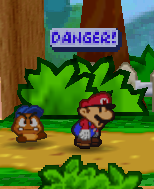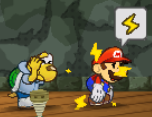Danger: Difference between revisions
Ace Shadow (talk | contribs) mNo edit summary |
|||
| (58 intermediate revisions by 29 users not shown) | |||
| Line 1: | Line 1: | ||
[[File:PM64 Danger.png|thumb|Mario in Danger status | [[File:PM64 Danger.png|thumb|Mario in Danger status, as seen in ''Paper Mario'']] | ||
'''Danger''' is a status effect that appears in all [[Paper Mario (series)|''Paper Mario'' games]]. It occurs when [[Mario]]'s or any of his [[Partner]]'s [[HP]] | '''Danger''' is a status effect that appears in all [[Paper Mario (series)|''Paper Mario'' games]]. It occurs when [[Mario]]'s or any of his [[Partner]]'s [[Heart Point|HP]] reaches a specific low amount, causing a bubble with the words 'Danger' to appear above them. An alarm sound is also played on repeat to remind the player to use [[List of items|healing items]]. A similar status, [[Peril]], also appears alongside it. | ||
<br | ==Appearances== | ||
[[Category: | ===''Paper Mario''=== | ||
[[Category:Paper Mario]] | In ''[[Paper Mario]]'', Danger is a status that automatically occurs when Mario’s HP is in the range of 2 to 5 points. If a character's HP reaches 1, however, Danger is overridden by the Peril status, which occurs with a similar, higher-pitched alarm playing. Several special [[badge]]s are activated, namely [[Power Rush]], [[Close Call (badge)|Close Call]], and [[Last Stand]] which will not lose their effect until the player is no longer in Danger. The player can allow Mario to always be in Danger by using [[Chet Rippo]] to lower his max HP to 5. By stacking [[Power Rush]] badges, Mario can do large amounts of damage to singular enemies. | ||
[[Category:Paper Mario: The Thousand-Year Door]] | |||
[[Category:Super Paper Mario]] | ===''Paper Mario: The Thousand-Year Door''=== | ||
[[Category:Paper Mario: | [[File:Mariokoopsdanger.png|frame|left|Mario in Danger in ''Thousand-Year Door'']] | ||
[[File:Goombella-Danger PMTTYD-NS.png|frame|right|[[Goombella]] in Danger in the ''Thousand-Year Door'' remake]] | |||
The Danger status effect reappears in ''[[Paper Mario: The Thousand-Year Door]]'' and [[Paper Mario: The Thousand-Year Door (Nintendo Switch)|its Nintendo Switch remake]]. In this game, the special badges reappear along with new partner-only counterparts, which are [[Power Rush P]], [[Close Call P]], and [[Last Stand P]]. The partner badges are exclusive to this game, as partners are now given their own HP unlike in ''Paper Mario''. These badges do not lose their effect when in Peril, and will actually stack with [[Mega Rush]] and [[Mega Rush P]], the only Peril-activated badges. Like in ''Paper Mario'', Mario and his partners can put themselves in Danger permanently by using Chet Rippo to lower their max HP. | |||
Mario can obtain an indefinite amount of Power Rush and Power Rush P badges from the [[Pianta Parlor]], where they can be bought for 34 [[pianta token]]s each (100 pianta tokens in the remake), allowing the player to potentially set themselves up to deal the maximum possible damage of 99 per hit. | |||
{{br}} | |||
===''Super Paper Mario''=== | |||
Danger appears again in ''[[Super Paper Mario]]'' as '''Critical''', with a different criteria for activating. Instead of being activated by a character having 2-5 HP, it instead occurs when any given character has less than 20% of their max HP. As badges do not exist in this installment, being in Critical has no practical use other than to remind the player to heal themselves. | |||
===''Paper Mario: Sticker Star''=== | |||
Danger in ''[[Paper Mario: Sticker Star]]'' happens when Mario has 30% or lower of his max HP. When in Danger, Mario assumes a slumped-over position and is seen panting. In this game, rather than an alarm sound playing, the battle music changes to a distorted, off-key version. | |||
===''Paper Mario: Color Splash''=== | |||
In ''[[Paper Mario: Color Splash]]'', Danger occurs when Mario is very low on HP. Like in ''Sticker Star'', Mario has a tired expression and the battle music distorts. During Danger, the GamePad view has a red vignette border around the screen. Enemies in Danger also have different animations and appear heavily drained of their color. | |||
===''Paper Mario: The Origami King''=== | |||
Danger appears in ''[[Paper Mario: The Origami King]]'' when Mario is at low HP. A red border pulses around the corners of the screen when Mario is selecting his attacks and in the overworld. It can also be inflicted on enemies, who have slower animations and orange name tags while in this state. In this game, the battle music does not distort; instead, its volume decreases. | |||
==Gallery== | |||
<gallery> | |||
SPM Danger.png|Luigi in Danger in ''[[Super Paper Mario]]'' | |||
PMSS Danger.png|Mario in Danger in ''[[Paper Mario: Sticker Star]]'' | |||
PMCS Danger.png|Mario in Danger in ''[[Paper Mario: Color Splash]]'' | |||
PMTOK Danger.png|Mario in Danger in ''[[Paper Mario: The Origami King]]'' | |||
</gallery> | |||
==Names in other languages== | |||
{{foreign names | |||
|Jap=ピンチ | |||
|JapR=Pinchi | |||
|JapM=Pinch | |||
|ChiS=危险<ref>From [[iQue]]'s localization of ''[[Paper Mario]]'': https://www.youtube.com/watch?v=qj23Urolr1I (1:31:43)</ref> | |||
|ChiSR=Wēixiǎn | |||
|ChiSM=Danger | |||
|Spa=Peligro<br>PELIGRO | |||
|SpaN=''Thousand-Year Door'' alert bubble | |||
|SpaM=Danger<br>DANGER | |||
|Kor=위기 | |||
|KorR=Wigi | |||
|KorM=Crisis | |||
}} | |||
==References== | |||
<references/> | |||
{{PM}} | |||
{{PMTTYD}} | |||
{{SPM}} | |||
{{PMSS}} | |||
{{PMCS}} | |||
{{PMTOK}} | |||
[[Category:Paper Mario status effects]] | |||
[[Category:Paper Mario: Sticker Star status effects]] | |||
[[Category:Paper Mario: The Origami King]] | |||
[[Category:Paper Mario: The Thousand-Year Door status effects]] | |||
[[Category:Super Paper Mario status effects]] | |||
[[Category:Paper Mario: Color Splash status effects]] | |||
[[it:Pericolo]] | |||
Latest revision as of 13:11, October 27, 2024
Danger is a status effect that appears in all Paper Mario games. It occurs when Mario's or any of his Partner's HP reaches a specific low amount, causing a bubble with the words 'Danger' to appear above them. An alarm sound is also played on repeat to remind the player to use healing items. A similar status, Peril, also appears alongside it.
Appearances[edit]
Paper Mario[edit]
In Paper Mario, Danger is a status that automatically occurs when Mario’s HP is in the range of 2 to 5 points. If a character's HP reaches 1, however, Danger is overridden by the Peril status, which occurs with a similar, higher-pitched alarm playing. Several special badges are activated, namely Power Rush, Close Call, and Last Stand which will not lose their effect until the player is no longer in Danger. The player can allow Mario to always be in Danger by using Chet Rippo to lower his max HP to 5. By stacking Power Rush badges, Mario can do large amounts of damage to singular enemies.
Paper Mario: The Thousand-Year Door[edit]

The Danger status effect reappears in Paper Mario: The Thousand-Year Door and its Nintendo Switch remake. In this game, the special badges reappear along with new partner-only counterparts, which are Power Rush P, Close Call P, and Last Stand P. The partner badges are exclusive to this game, as partners are now given their own HP unlike in Paper Mario. These badges do not lose their effect when in Peril, and will actually stack with Mega Rush and Mega Rush P, the only Peril-activated badges. Like in Paper Mario, Mario and his partners can put themselves in Danger permanently by using Chet Rippo to lower their max HP.
Mario can obtain an indefinite amount of Power Rush and Power Rush P badges from the Pianta Parlor, where they can be bought for 34 pianta tokens each (100 pianta tokens in the remake), allowing the player to potentially set themselves up to deal the maximum possible damage of 99 per hit.
Super Paper Mario[edit]
Danger appears again in Super Paper Mario as Critical, with a different criteria for activating. Instead of being activated by a character having 2-5 HP, it instead occurs when any given character has less than 20% of their max HP. As badges do not exist in this installment, being in Critical has no practical use other than to remind the player to heal themselves.
Paper Mario: Sticker Star[edit]
Danger in Paper Mario: Sticker Star happens when Mario has 30% or lower of his max HP. When in Danger, Mario assumes a slumped-over position and is seen panting. In this game, rather than an alarm sound playing, the battle music changes to a distorted, off-key version.
Paper Mario: Color Splash[edit]
In Paper Mario: Color Splash, Danger occurs when Mario is very low on HP. Like in Sticker Star, Mario has a tired expression and the battle music distorts. During Danger, the GamePad view has a red vignette border around the screen. Enemies in Danger also have different animations and appear heavily drained of their color.
Paper Mario: The Origami King[edit]
Danger appears in Paper Mario: The Origami King when Mario is at low HP. A red border pulses around the corners of the screen when Mario is selecting his attacks and in the overworld. It can also be inflicted on enemies, who have slower animations and orange name tags while in this state. In this game, the battle music does not distort; instead, its volume decreases.
Gallery[edit]
Luigi in Danger in Super Paper Mario
Mario in Danger in Paper Mario: Sticker Star
Mario in Danger in Paper Mario: Color Splash
Mario in Danger in Paper Mario: The Origami King
Names in other languages[edit]
| Language | Name | Meaning | Notes |
|---|---|---|---|
| Japanese | ピンチ[?] Pinchi |
Pinch | |
| Chinese (simplified) | 危险[1] Wēixiǎn |
Danger | |
| Korean | 위기[?] Wigi |
Crisis | |
| Spanish | Peligro PELIGRO[?] |
Danger DANGER |
Thousand-Year Door alert bubble |
References[edit]
- ^ From iQue's localization of Paper Mario: https://www.youtube.com/watch?v=qj23Urolr1I (1:31:43)





